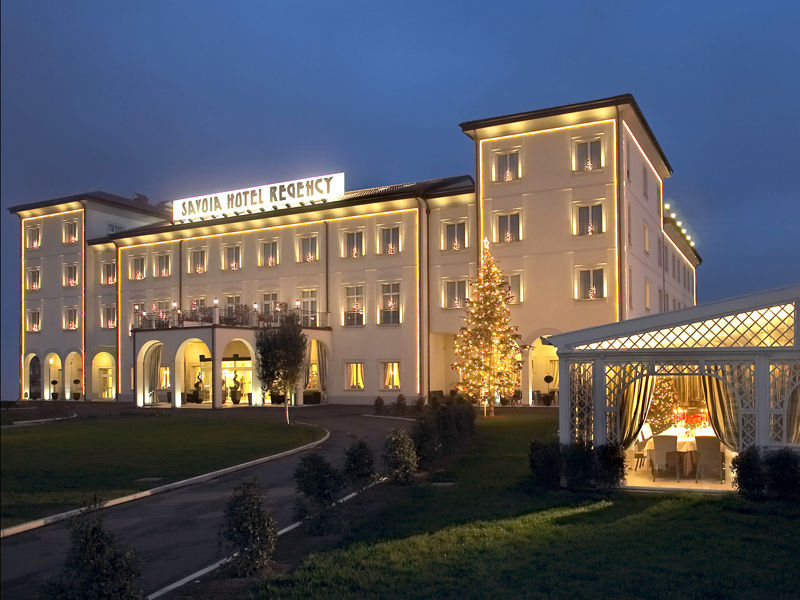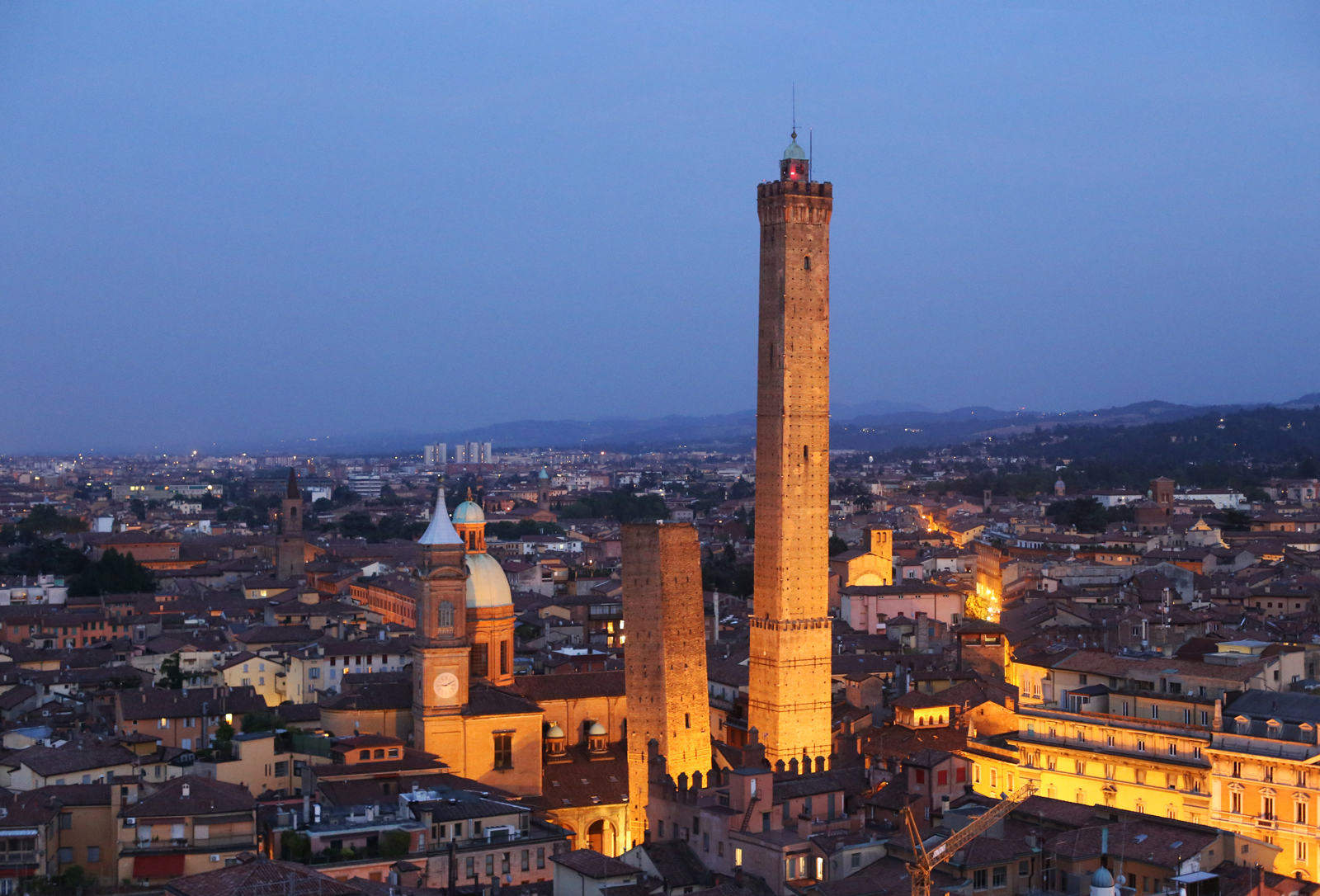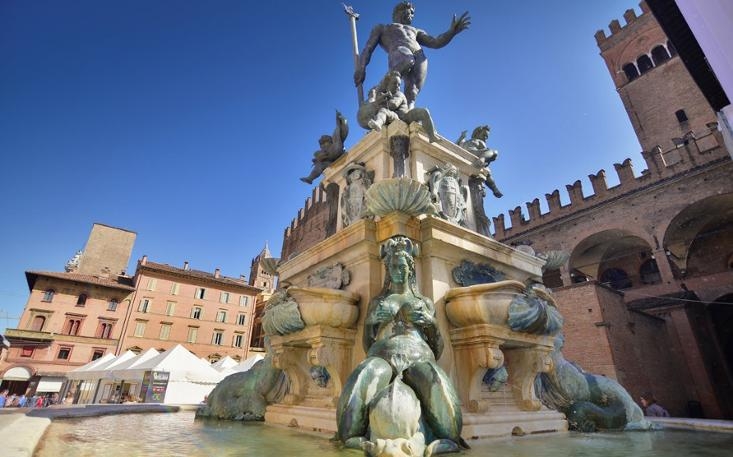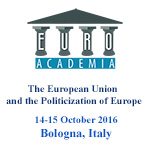Savoia Hotel Regency
Via del Pilastro 2
40 127, Bologna, ItalyConference Agenda
- October 14, 2016
- 09:00 - 09:30Participants' Registration (Registration Desk)
- 09:30 - 10:30Welcome and Opening Remarks / Opening Workshop: The EU and the Politicization of Europe
- 10:30 - 11:00Coffee Break and Snacks
- 11:00 - 13:00Panel 1: Thinking Contemporary Europe: The Politicization of Europe and the Integration/Disintegration Nexus in the European Union
- 13:00 - 14:30Lunch at Garganelli Restaurant
- 14:30 - 16:30Panel 2: Europeanization as a Process and the Ongoing European Crisis: Parties, Perceptions and Attitudes towards European Integration
- 16:30 - 17:00Coffee Break and Snacks
- 17:00 - 19:00Panel 3: European Cultural Diplomacy Instruments: From Art Exhibitions, Cultural Institutes to Public Diplomacy Tools
- 19:00 - 19:45Welcome Drink
- 19:45 - 21:00Optional Social Dinner Out in Bologna
- October 15, 2016
- 09:00 - 11:00Panel 4: Assessing the EU’s Normative Influence: Neighborhood Policy, Conflict Resolution and Foreign Policy Impact
- 11:00 - 11:30Coffee Break and Snacks
- 11:30 - 13:00Panel 5: Europeanization, the Future of European Integration and the EU Foreign Influence: Domestic Case Studies Analyses
- 13:00 - 14:30Lunch at Garganelli Restaurant
- 14:30 - 16:30Panel 6: Art as Cultural Diplomacy: Internationalism, Political Influence, and Instruments of Cultural Diplomacy
- 16:30 - 17:00Coffee Break and Snacks
- 17:00 - 19:00Panel 7: Economics of the Eurozone Crisis: EMU, European Trade and Fiscal Consolidation in Eurozone Economies
- 19:00 - 19:30Concluding Remarks and Discussions
- 19:30 - 21:00Optional Social Dinner Out in Bologna
- October 14, 2016
The European Union and the Politicization of Europe (Fifth Edition)

- Conference Description
- Participant’s Profile
- Registration and Fee
- Social Activities and Publication
- Important Dates
- Venue and Directions
- Conference Program
- Panel 1
- Panel 2
- Panel 3
- Panel 4
- Panel 5
- Panel 6
- Panel 7
The Fifth Euroacademia International Conference
The European Union and the Politicization of Europe
14 – 15 October 2016
Savoia Hotel Regency, Bologna, Italy
Conference Description
The European Union was described by Jacques Delors as an unidentified political object and by Jose Manuel Barroso as the first non-Imperial empire. The descriptors assigned to the European Union are creative and diverse yet the agreement on what is the actual shape that the EU is taking is by no means an easy one to be achieved. Historical choices shaped and reshaped the size and functioning of the EU while the goal of an emerging ‘ever closer union’ is still in search for the paths of real and not ideal accomplishment. The agreement seems to come when it’s about the growing impact of the decisions taken in Brussels on the daily lives of the European citizens and the increasingly redistributive outcomes of the policy choices inside the EU. These dynamics created the framework for the politicization of Europe and opened a vivid debate about the direction and proportions of such a process.
The politicization of Europe takes various shapes and addresses significant puzzles. While it is clear that the EU doesn’t resemble a state it is less clear if the decisions that shape its policies are configured by Pareto efficient outcomes or by dynamics that are intrinsic to a political system and defined by emerging party politics within the European Parliament. The democratic problem or the democratic deficit issue was and continues to be one of the main challenges facing the European Union in any terms or from any position is understood or described. The problem of accountability for the decision making inside the EU was there from the beginning and it emerged gradually as more emphatic on the agenda of vivid debates as the powers of the EU have grown after the Maastricht Treaty. This was concomitant with a growing disenchantment of citizens from member states with politics in general, with debates over the democratic deficits inside member states, with enlargement and with a visible and worrying decrease in voters’ turnouts at both national and especially European elections. The optimist supporters of EU believe in its power to constantly reinvent and reshape while the pessimists see either a persistence of existing problems or a darker scenario that could lead in front of current problems even to the end of the EU as we know it.
The Fifth International Conference ‘The European Union and the Politicization of Europe’ aims to survey some of these current debates and addresses once more the challenges of the EU polity in a context of multiple crises that confronted Europe in recent years. It supports a transformative view that involves balanced weights of optimism and pessimism in a belief that the unfold of current events and the way EU deals with delicate problems will put an increased pressure in the future on matters of accountability and will require some institutional adjustments that address democratic requirements for decision making. However in its present shape and context the EU does not look able to deliver soon appropriate answers to democratic demands. In a neo-functionalist slang we can say as an irony that the actual crisis in the EU legitimacy is a ‘spillover’ effect of institutional choices made some time before. To address the EU’s democratic deficit however is not to be a skeptic and ignore the benefits that came with it but to acknowledge the increasing popular dissatisfaction with ‘occult’ office politics and with the way EU tackles daily problems of public concern while the public is more and more affected by decisions taken at the European level.
Is the EU becoming an increasingly politicized entity? Is the on-going politicization of Europe a structured or a messy one? Do political parties within the European Parliament act in a manner that strengthens the view of the EU as an articulate political system? Are there efficient ways for addressing the democratic deficit issue? Can we find usable indicators for detecting an emerging European demos and a European civil society? Does a Europeanization of the masses take place or the EU remains a genuinely elitist project? Did the Lisbon Treaty introduced significant changes regarding the challenges facing the EU? Can we see any robust improvements in the accountability of the EU decision making processes? Are there alternative ways of looking at the politicization processes and redistributive policies inside the EU? These are only few of the large number of questions that unfold when researchers or practitioners look at the EU. It is the aim of the Fifth International Conference ‘The European Union and the Politicization of Europe’ to address in a constructive manner such questions and to offer o platform for dissemination of research results or puzzles that can contribute to a better understanding of the on-going process of politicization within the European Union.
Participant’s Profile
The conference is addressed to academics, researchers and professionals with a particular interest in Europe, Europe related and European Union topics from all parts of the world. As the nature of the conference is intended to be multidisciplinary in nature, different academic backgrounds are equally welcomed. Cultural approaches, political studies, critical studies, out of mainstream approaches and artistic/literary contributions to the better understanding of Europe in its past present and future dimensions are all equally welcomed. Euroacademia favors alternative and innovative thinking proposals and non-mainstream methodologies.
Post-graduate students, doctoral candidates and young researchers are welcomed to submit an abstract. Representatives of INGOs, NGOs, Think Tanks and activists willing to present their work with impact on or influenced by specific understandings of Europe and/or the European Union are welcomed as well to submit the abstract of their contribution.
Abstracts are reviewed and the participants are selected based on the proven quality of the abstract. The submitted paper for the conference proceedings is expected to be in accordance with the lines provided in the submitted abstract.
Registration and Fee
Registration is now closed
The Participation Fee Includes:
- the registration fee
- participant’s package with all the materials for the conference
- full access to the conference proceedings
- eligibility for inclusion in the conference proceedings published volume
- a copy of the published volume
- access to Euroacademia discussion group and newsletters
- coffee brakes and refreshing drinks for all the duration of the conference
- welcome drink on 14th of October 2016
- seated buffet lunch on 14th of October 2016 at the 4* Restaurant Garganelli
- seated buffet lunch on 15th of October 2016 at the 4* Restaurant Garganelli
- certificate of attendance
- access to optional social program
Unfortunately, Euroacademia has no available funds for covering transport and accommodation to/in Bologna. Participants are responsible for securing funding to cover transportation and accommodation costs during the whole period of the conference. Official invitation letters can be sent by Euroacademia to the financing institutions of selected participants to confirm the selection and participation in the conference upon request.
Social Activities
A specific spot in the conference program will be dedicated to social networking and therefore all the participants interested in setting or developing further cooperation agendas and prospects with other participants will have time to present and/or promote their project and express calls for cooperation.
A specific setting (Social Corner) for promotional materials connected with the topic of the conference will be reserved for the use of the participants. Books authored or edited by the participants can be exhibited and promoted during the whole period of the conference and can also be presented within the conference package based on prior arrangements.
Photos and videos will be taken during the conference and the organizers will consider through the participation of selected presenters or members of the audience that the agreement for being photographed or filmed during the event was granted through registration to the event. Please notify the organizers in written form prior to the the event if you are a confirmed participant and would prefer otherwise.
An optional dinner and a social event will be organized for the first and second evenings of the conference in a typical Italian cuisine restaurant as optional program for the willing participants. The social dinner will be held based on participant’s confirmation and it costs around 25 Euro to be covered individually by participants.
Publication:
Selected papers will be eligible for publication in an electronic volume with ISBN after the confirmation of the authors and a double peer-review process based on an agreed publication schedule. All the papers selected for publication should be original and must have not been priory published elsewhere. All participants to the conference will receive a copy of the volume.
Specific selected papers will be also published in CEJISS (Central European Journal of International & Security Studies)
About CEJISS
Formally launched in January 2007, CEJISS is designed as a double-destination scholarly bridge. The first bridge was constructed with Central Europe (Czech Republic, Hungary, Poland and Slovakia) in mind, focusing on increasing the audience for Central European scholars. In this regard, CEJISS is making a substantial impact as each issue attracts attention in some 45,000 people in nearly 160 countries. However, CEJISS is not Central European centric and invites scholars from around the world to contribute. This has meant that just as Central European scholars now have an easier time gaining a footing outside of the region, so international scholars also have an easier time getting in and making an impact here. With a mere two decades separating our times from the ‘darker’ Cold War years, CEJISS aims to contribute English language perspectives to the peoples of Central Europe and give the latter the amplification their research deserves.
| Important Dates | |
|---|---|
| 1st of July 2016 | Deadline for Submitting Panel Proposals |
| 9th of September 2016 | Deadline for Paper Proposals: 300 words abstracts and details of affiliation |
| 10th of September 2016 | Latest notification of acceptance |
| 12th of September 2016 | Sending the Registration Form |
| 17th of September 2016 | Payment of the conference fee |
| 30th of September 2016 | Sending the draft paper to be uploaded on the conference website |
| 1st of October 2016 | Publication of the conference program and uploading the draft papers on the website |
| 14th of October 2016 | The conference commences at 9.00 am |
Venue and Directions
The conference will take place in the exquisite conference premises of the 4* Superior Savoia Hotel Regency, located few kilometers away from the historical center of Bologna in the heart of a beautiful green domain. A 10 000 square meters park surrounds the beautiful XVIII-th century villa offering excellent circumstances for professional events. The Savoia Hotel Regency is easily reachable by car and offers free parking, and also a short ride by public bus or taxi from the city center of Bologna or airport.
4* Savoia Hotel Regency – Bologna
Via del Pilastro, 2 Bologna can be easily reached by plane, train car or bus. Bologna has its own international airport situated conveniently close to town. Alternatively, Bologna can also be reached by flying to Florence that is regularly connected by trains to Bologna.
40127 Bologna Italy
E mail: [email protected]
Bologna is one of the beautiful cities of central Italy, capital of Emilia-Romangna region, containing an immense wealth of important medieval, renaissance, and baroque artistic monuments. Bologna hosts the oldest university in the world and is famous for having only in the historic center 38 kilometers of elegant arcades. The leaning towers of Bologna – the central “Due Torri” (Asinelli and Garisenda) – are iconic popular symbols of the town. The red roofs in the historic center are a typical splendor of the town that made Bologna to be nicknamed “la rossa”. Home town of Guglielmo Marconi and Pier Paolo Pasolini among many personalities that lived there, Bologna became adoptive town for Umberto Eco. Add to all that the famous Bologna cuisine and you have still a minimal impression of the unique atmosphere of Bologna.
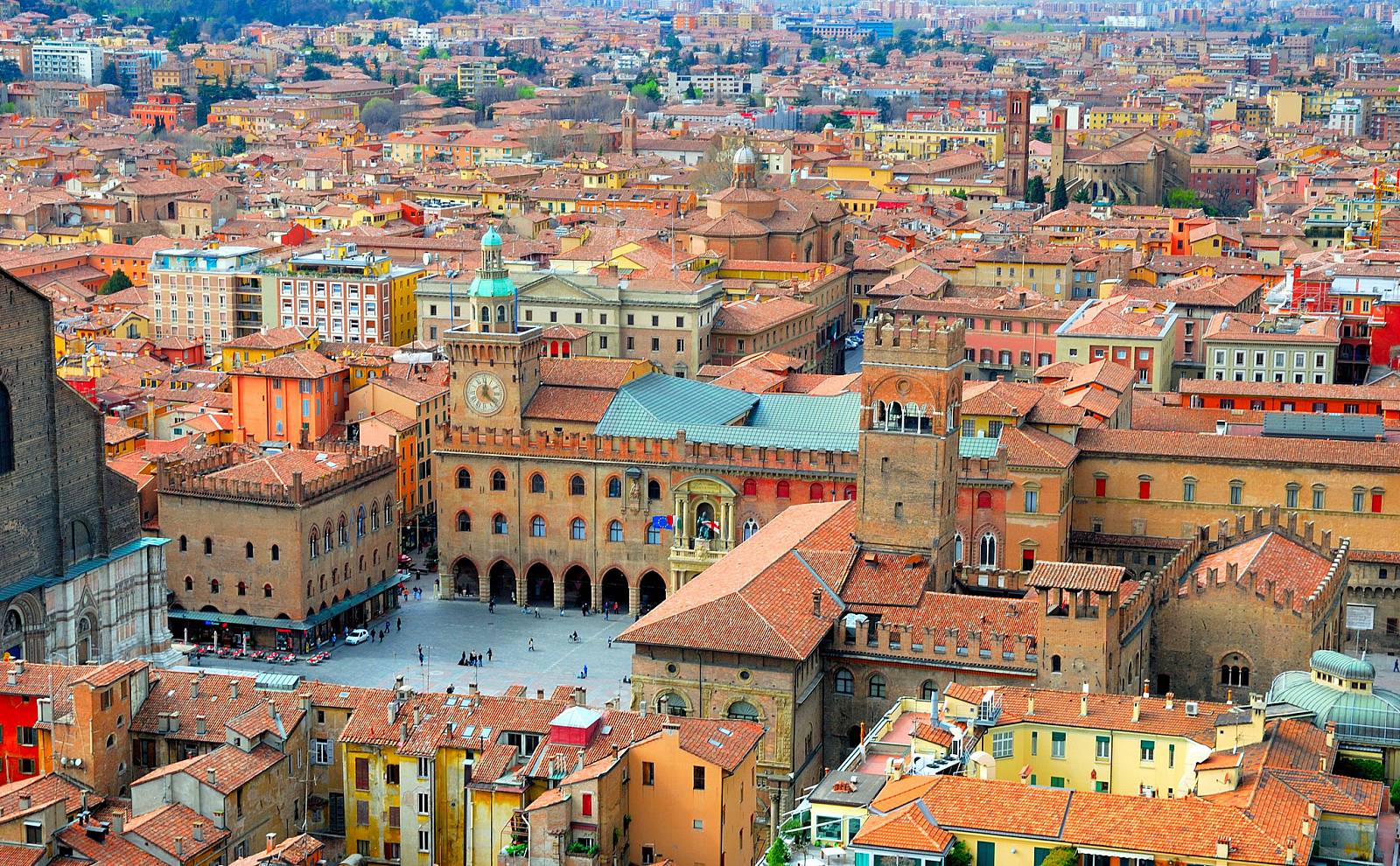
See map with details for arriving at the conference location:
HERE
Conference participants are fully responsible for arranging their accommodation and travel to Bologna.
Conference Program
The Conference Agenda is available in the right sidebar.
The conference program with abstracts and available draft papers is accessible below by clicking on the panel number tabs and individual presentations.
Thinking Contemporary Europe: The Politicization of Europe and the Integration/Disintegration Nexus in the European Union
- Theorizing European Disintegration in Times of ComplexityThe paper makes three central claims. First, the European subject is polymorphous. Europe is realized in multitudinal assemblages and practices. Second, European integration is essentially relational rather than unidirectional. Third, the European subject is both symbolic and material. Europe is enacted by speeches, monuments, flags but also documents, technologies, financial instrument, architectural artefacts, or agricultural land. In the context of redefining European integration as multitudinal, disintegration is debunked as a useful concept and events widely referred to as disintegration are consequently re-examined via the actor-network theory.Senka Neuman Stanivukovic, Department of International Relations and International Organization, University of Groningen / Euroculture, The Netherlands
- The Brexit Vote: Conceptualizing European (Dis)IntegrationThis paper will take stock of the emerging literature on European (Dis)integration (Schmitter and Lefkofrid 2015; Scheller and Eppler 2014; Vollaard 2014; Oliver 2015) and will apply it to the outcome of British EU referendum. In particular, the contribution will explore the Brexit vote by comparing and contrasting Neo-functionalism's concept of "spillback" and "countervailing forces" with the six hypothsesis of the New Intergovernmentalism.Antonio Sergio, Aston Centre for Europe, Aston University, Birmingham UK
- Politicization and Crises of European Integration: For a Re-Politicization of the European UnionThe paper argues that the negative impact of such politicization has been over-estimated by Hooghes and Marks while its positive impact has been under-estimated. In other words, the possibility of a re-politicization of the EU integration project. The condition, however, to capitalize on its positive impact lies in the need for the EU to change its approach, from technocratic one to what we call a more pragmatist one.Jean F. Crombois, American University in Bulgaria
- Europe and the Last 30 years – Consequences of Abandoning Qualitative DistinctionsThe paper outlines the concepts prevailing during the passage from "European Community" to "European Union", also Great Britain's changing role in the Community. Observing economic crises not as individual events, but as continuously increasing developments of ever increasing frequency and amplitude, the paper also focuses upon the principal errors leading to such ever accelerating downturn and its consequences for society, in order to outline what, instead, as prerequisites, leads to sustainable development, employment and prosperity.Gerhard Eichweber, Silva Plan / Value Group, Switzerland
Europeanization as a Process and the Ongoing European Crisis: Parties, Perceptions and Attitudes towards European Integration
- Politicisation of the EU During European Crises – Example of the German Post-Communist LeftThis paper is concerned with the radical and its reaction on the three recent crises: The Euro Crisis, The Ukraine conflict and the Refugee crisis. Here the German party Die Linke is examined. The party is from interest because it presented in all of the crises rather views off the main stream. In the center of the analysis is the question how the party responded to the crisis and used them. It should also be considered if the decisions taken on European level are pushing the party to new programmatic ideas or policy proposals. In order simplify it the paper is concerned with the politicization of the EU within the party.Andreas Goffin, Institute of International Area Studies, Charles University Prague
- Fortress Europe: The Dangers of Democratic InsecuritiesEuropean Community begs for a deepened reflection regarding the drivers and determinants of these phenomena and decide whether radicalisation of European politics is a temporary occurrence or will it become a permanent feature of European political landscape due to structural reasons. This paper argues that the crisis of societal security (Buzan et al. 1998) manifests itself through a crisis of representative democracy (Rosanvallon 2008) institutions and mechanisms visible in “radicalisation of politics” taking forms of anti-establishment initiatives (radical parties, social movements, and vigilante groups) and various forms of direct democracy (referenda, manifestations, demonstrations).Monika Gabriela Bartoszewicz, Vistula University, Poland
- The Role of Civilizational Identity in Shaping Public Attitudes on Foreign PolicyFollowing the constructivist route, this study aims to analyze the role of identity on individual attitudes on foreign military interventions. More specifically, drawing from the literature on democratic peace theory and clash of civilizations this paper investigates to what extent culturally and ideologically similar countries will be labelled as 'we' by the public and perceived positively whereas dissimilar countries will be perceived as 'others' which will be followed by a negative reaction in foreign policy attitudes.Osman Sabri Kiratli, Boğaziçi University, Istanbul, Turkey
- The Borders of EuropeThe aim of this paper is to show how Europeanisation should not be seen as a standing element, but rather as one of the main knots in which the global flows of culture, images and ideas crossing the European’s imagination are entangled. Europeanisation is to be considered as a discursive process through which the European identity (the so-called Europeanness) becomes part of a wider narration that includes other symbols, values, imagines etc. The paper is based on an ethnographic research carried out on the island of Cyprus after the economic and financial crisis of 2013. It analyses the rhetorical use of the adjective European by Greek-Cypriots when asked to define their ethnical and national identity as well as the way it changes depending on the different “Other” Cypriots want to distinguish from.Federico Cavalleri, University of Milano-Bicocca, Italy
European Cultural Diplomacy Instruments: From Art Exhibitions, Cultural Institutes to Public Diplomacy Tools
- “Le tenebroso est à la mode”. The Prado Museum and the Italian Baroque Exhibitions in the Economic Golden Age of Western EuropeIn 1957 Europe would live a very important moment for its unification: the signing of the Treaty of Rome which established the new EEC. And the best way to celebrate it was with an exhibition à la mode about Il Seicento europeo. This mostra pointed a new geographic dimension in the historiography: beyond the construction of national histories of art was gradually forged a new history about an artistic Europe with a coherent identity. But Spain –and therefore the Prado– was a resounding absence. The museum gave up its loans policy and this involved a turning point in the construction of the Spanish Art History in the European context.Patricia García-Montón González, Universidad Complutense de Madrid, Spain
- Behind the Synthetic Curtain: The Politics of Plastic in CzechoslovakiaUsing Design A Plastické Hmoty as a starting point, I explore the material and cultural importance of plastic and its design within Czechoslovakia’s Fifth Five-Year Plan. My study contextualizes Lamarova’s project within several utopian collaborations between artists and polymer chemists that were shut down after the Soviet invasion of 1968 and the lingering anxiety over plastic’s “capitalist” aesthetic. Focusing on furniture and home accessory design, I consider how plastics shaped the socialist consumer’s interaction with her changing environment, and examine the role of exhibition catalogue publishing as an act of soft diplomacy.Roksana Filipowska, Doan Fellow, Chemical Heritage Foundation / University of Pennsylvania, USA
- The International Activity of Cultural InstitutesThe 21er Haus in Vienna and the structure (architecture) that was awarded a prize during the cold war at the world fair, transferred to Vienna to serve as the museum of contemporary art and today is showing work mostly by Austrian artists but currently bei Ai WeiWei -- this type of history as a carrier of Austrian culture and art to showing an artist who works on an international scale (with a political agenda) demonstrates the international activity of one art museum. This paper would cover the history of the house as well as the current exhibition and the vice-directors purpose behind the exhibition. The paper would be both historical and cover the current political and cultural activity of the museum.Gretchen Simms, University of Vienna and the University of Applied Arts, Vienna, Austria
- Bologna’s Iconography. The Representation of the City in the Paintings of Pinacoteca NazionalePerceived city and real city are two artistically distinct concepts that do not always identify themselves in a unique representation, due to the architectural presence. Analyzing the paintings inside the Pinacoteca Nazionale di Bologna, this paper wants to focus on how and why the representation of the city of Bologna differs from the real urban landscape between the fourteenth and the seventeenth century, despite the presence of the great architectures that have profoundly marked the face of the city as well as still perceived.Denise Tamborrino, Polo Museale dell'Emilia-Romagna, Italy
Assessing the EU’s Normative Influence: Neighborhood Policy, Conflict Resolution and Foreign Policy Impact
- How do Israeli Government Officials Perceive the EU Neighborhood Policy? Implications to Normative Power EuropeTaking Israel as a case-study, a semi-structured interview approach was used to study the perceptions and attitudes of senior technical officers and decision-makers in four Ministries of the Israeli government. This paper will examine NPE from a new angle by exploring whether capacity building is a new form of diffusion of NPE that has not been previously identified and characterized. Specifically, this study seeks to analyze the relation between capacity building in European neighborhood and NPE and contribute to the theoretical discourse spanning NPE by assessing if capacity building is indeed a modality of normative diffusion.Lia Moran-Gilad, Dep. of Politics and Government, Ben-Gurion University of the Negev, Israel
- What Kind of Role Should the European Union Play for Achieving Sustainable Peace in Georgia? : Improving the Effectiveness of the European Union Monitoring Mission in Georgia (EUMM)This research discusses the EU’s role in Georgia, with specific focus on improving the effectiveness of the EUMM. What kind of role should the EU play in Georgia for achieving sustainable peace? It argues that the EUMM should focus not only on early warning but also other conflict prevention activities e.g., post-conflict stabilization. Moreover, it provides implications that emphasize the importance of conflict transformation for addressing protracted conflicts via the Incident Prevention and Response Mechanism (IPRM), which was established in tandem with the Geneva International Discussions.Shu Uchida, Marie Curie Early-Research Fellow, The University of Coimbra, Portugal
- The EU’s Changing Discourse in the EU Documents on Civil Society in TurkeyConsidering democratic changes of Turkey, the position of civil society and their ability to self-expression, it is crucial to determine their situation. In this regard this study will focus on the EU’s changing discourse about the civil society in Turkey in the progress by analysing the Commission reports and the EP resolutions. By doing so, it has been aimed to show changes of the EU’s perception on Turkey’s accession process.Alper Yurttas, Istanbul University, TurkeySelma Sekercioglu, Nisantasi University, Turkey
- European Diplomacy: Mediocrity of Diplomatic Action in Syria It is extremely important in today’s globalizing world that the EU stays a global foreign policy actor and not only a mediator or a soft power. That chance is given to the EU with the Geneva process, by leading the peace initiative and by promoting its diplomacy. Effective diplomacy will demand compromises that will aim to secure an international settlement. This has to be done by bringing the Syrian and regional participants on the same table. The challenges to the diplomatic success are big but Europe should promote the idea of peace and stability in Syria and not in any case fall under the temptation to trap Russia into a swamp, in which it can fall itself.Elena Tilovska-Kechedzi, Faculty of Law, University St. Kliment Ohridski, Bitola, Macedonia
Europeanization, the Future of European Integration and the EU Foreign Influence: Case Studies Analyses
- Europeanisation of the Serbian Party System – Accountability to Brussels or to the People?Candidate states usually begin their EU accession process with high level of EU enthusiasm and end up with significant euro skepticism. Serbian case is different due to strong pre-existing divisions regarding EU integration during the initial phase – negotiations for a Stabilization and Association Agreement (2005). However, in the last 10 years euro skepticism has been gradually pushed away from the mainstream arena of Serbian politics, reaching the point that the anti EU parties have not even been represented in the parliament in the last years. In this paper we are analyzing the process of Europeanization of the Serbian party system as the consequence of EU integration process and cooperation of Serbian parties with their European ideological counterparts.Dusan Spasojevic, Faculty of Political Sciences, University of Belgrade
- Pragmatism and the Turkish Strict Position towards the 2013’s Coup in EgyptThis research studies the motives behind the Turkish position and identifies what pragmatism is in order to analyze the Turkish position towards the Egyptian coup in light of the school of pragmatism, hence this paper attempts to answer the question: What are the motives that had driven Turkey to strictly reject the coup in Egypt?, and was the Turkish position in this regard a pragmatic?Ali Abo Rezeg, Turkish State Anadolu Agency and Yildrim Bayazit University, Turkey
- Media Analyses of Political Crisis and the Enlargement Policy of the European Union: Impact on European Integration Processes in MacedoniaThrough the analysis of media content, interviews with academics and experts in the European integration processes, this research assesses and confirms the thesis that the institutional and political crisis in the EU mediated by the unresolved Greek blockade affects the integration processes of Macedonia, or the agreement on a date for starting negotiations for accession to membership.Liljana Siljanovska, South East European University, Tetovo
- The European Union And The Same Gender Relationship – A Legal ViewThe paper intends to address the following questioning: what is the current legal treatment given by the European Union law to the same gender relationships and if there is a reglementation’s need to the theme. Considering the European citizens mobility, the European Union foundation on the free movement, the values of non-discrimination and respect for privacy, it is paradoxical the situation that exists in some countries that treat the topic in such different legal positions. This scenario leads to the impossibility to uniformly exercise the individual rights in the EU for those part of a same sex relationship.Flávia Faermann, The Federal University of Rio Grande do Sul, Porto Alegre, Brazil
Art as Cultural Diplomacy: Internationalism, Political Influence, and Instruments of Cultural Diplomacy
- American Internationalism and Cultural Diplomacy: The Rise and Decline of an idea in the Twentieth CenturyCommitted internationalists became cultural diplomats in the United States government or as private citizens in the pre-war period spreading mutual understanding and democratic values worldwide. They did battle against other Americans who then as now saw treachery in the outside world and opposed cultural diplomacy as a feeble or dangerous response. This presentation also offers a usable past of Americans who embraced an increasingly integrated globe, but at the same time a sobering reminder of the roadblocks to internationalism. American Internationalism provides insight into a world we should well remember as we grapple with the sometimes disagreeable realities of an interconnected globe.Jon Davidann, Hawaii Pacific University
- Diplomatic Instruments: U.S. Symphony Orchestras And The Cold WarThis paper will explore the intersection between classical music and international politics during the Cold War. As part of a larger study I am working on, Dangerous Melodies and Diplomatic Instruments: When Classical Music Mattered in America (W.W. Norton, forthcoming), which explores the relationship between classical music in the United States and twentieth-century world affairs (from the Great War to the Cold War).Jonathan Rosenberg, Hunter College and the CUNY Graduate Center, USA
- The Difference Between Art as Propaganda and Art as Cultural DiplomacyIn my paper I would compare the mission of artists as opposed to governments in addressing political issues. The Cold War and the American National Exhibition in Moscow would serve as a prime example of how art was used as propaganda. Exhibitions at the America Houses and at galleries in Austria would serve as further examples to underline the cultural diplomacy of the United States. In looking at Europe and how artists were influenced by this and how their art evolved due to exhibitions viewed by them (Pichler and Attersee for example) I would be able to demonstrate how contemporary Austrian artists and their political expressions are not used as propaganda by any government but as an artistic message from the artist to an audience.Gretchen Simms, University of Vienna and the University of Applied Arts, Vienna, Austria
- Exploring Arts Based Ways to Counter Radicalization Among YouthA team of three Muslim women co-organized BreakWord, a spoken word gathering during the fall 2010 term. This event was executed as an assignment for a Trauma and Healing event. The underlying need the event aimed to address was the traumatization of Muslim youth as a group due to the current geo-political trends. The assumption behind BreakWord was that communication about identity issues and encouraging civic engagement can help to decrease the tendency towards violent radicalization.Fatima Ahmed, St. Francis Xavier University, Nova Scotia, Canada
Economics of the Eurozone Crisis: EMU, European Trade and Fiscal Consolidation in Eurozone Economies
- Adjustment In The Us And European Monetary Unions: The Cases Of Puerto Rico And GreeceForm an Optimum Currency Area perspective this paper provides a comparative analyzes between the (ongoing) Puerto Rican and Greek debt crisis and between the United States and European monetary unions. More specifically, the thesis engages with two of OCA’s criteria required to sustain monetary unions in the long run: the Insurance Principle and homogeneity of policies. The contribution aims to answer the following research question: how to share the cost of adjustment in a monetary union?Antonio Sergio, Aston Centre for Europe, Aston University, Birmingham UK
- Scale Economies in European TradeUsing the gravity framework, I investigate the existence of economies of scale in trade costs for European international trade. 26 manufacturing sectors exhibit such scale economies: a 10% increase in trade volume corresponds on average to a 0.64% decrease in trade costs. It appears that the EU expansion affected these economies of scale, though this happened for some sectors only: trade with an EU partner entails scale elasticities 50% lower than trade with a non-EU member for 11 sectors out of the 26 considered. I also investigate whether scale elasticities can be rationalized by the existence of informational asymmetries.Laura Bonacorsi, Boston College, USA
- Fiscal Consolidation, Shadow Economy and the Sustainability of Private Consumption: Further Evidence from Selected Eurozone EconomiesThis research uses an alternative growth of private consumption approach using dynamic panel data regression analysis of 17 (14 excluding Estonia, Latvia and Lithuania) Eurozone countries and endeavors to shed light on these issues. Empirical findings show that consolidation periods experience a marginal lower private consumption growth, questioning the generality of neoclassical theory implication. Furthermore, as expected, informal economy leads to a higher private consumption, but with a high cost for public economicsIoannis Kostakis, Harokopio University, AthensEleni Theodoropoulou, Harokopio University, Athens











